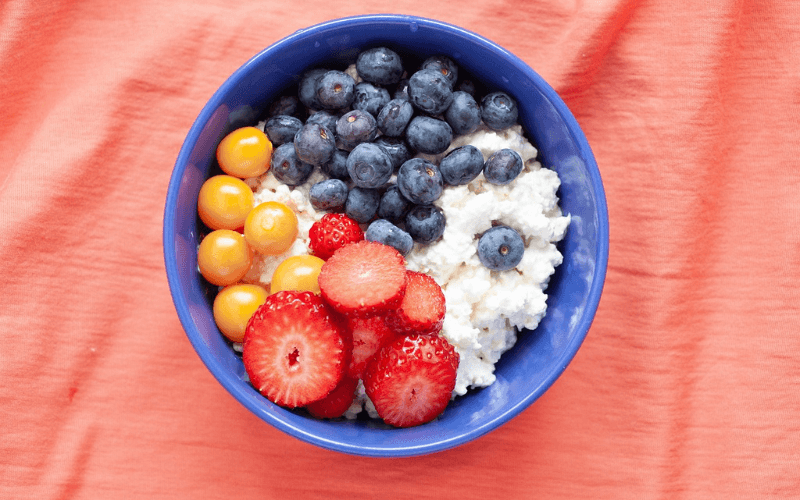Cottage cheese is commonly consumed as a healthy snack or as an ingredient in various dishes. However, there is often confusion about whether cottage cheese is considered a dairy product.
Here you’ll learn about the composition of cottage cheese and whether it is classified as a dairy product.
Understanding Cottage Cheese
Cottage cheese has been around for centuries. Details of its origin are murky but there is evidence that the ancient people were making a form of it in Mesopotamian some 5,000 years ago. and is believed to have originated in Europe. The name “cottage cheese” comes from the traditional method of making it in small cottages or homes. Initially, it was made by allowing milk to sour naturally, and then the curds (lumps) were separated from the whey (liquid). Over time, the process evolved, and today, cottage cheese is typically made by curdling milk with an acidic substance like vinegar or lemon juice.
Composition of Cottage Cheese:
Cottage cheese is primarily made from cow’s milk, although variations using goat’s milk or sheep’s milk can also be found. To understand whether it is dairy, we need to examine its composition.
Cottage cheese is made by adding an acidic component to milk, which causes it to curdle. The curdling process forms solid curds and liquid whey. The curds are the lumpy parts of the cottage cheese, while the whey is the liquid that separates from the curds. The curds are then drained and rinsed to remove excess whey.
Cottage Cheese is Dairy
So, is cottage cheese considered dairy? The answer is yes, cottage cheese is indeed a dairy product. It is made from milk from a mammal, the primary source of dairy.
Although the curdling process alters the milk’s structure, it remains a product derived from milk and is thus a dairy product. You should avoid cottage cheese if you have a dairy restriction due to allergies, veganism, or various other reasons.
Health Benefits of Cottage Cheese:
Cottage cheese is known for its numerous health benefits, making it a popular choice among health-conscious individuals. In fact, from the 1950s to the mid-1970s cottage cheese was very popular diet food until it was eclipsed by the rising popularity of yogurt going into the 1980s.
Here are a few reasons why cottage cheese can still be a healthy addition to your diet despite its decrease in consumption over the previous several decades:
- Protein-Rich: Cottage cheese is a great source of protein, which is essential for growth, repair, and maintenance of body tissues. For example, a 1/2 cup serving of Daisy 4% cottage cheese contains 26% daily value of protein based on a 2,000 calorie diet for healthy adults.
- Calcium Content: Cottage cheese is rich in calcium, which is a mineral that is important for strong bones and teeth. You’ll get about 6-8% daily value of calcium from a 1/2 cup of cottage cheese.
- Low in Fat: Depending on the variety, cottage cheese can be low in fat, making it a suitable option for those watching their fat intake. There are even fat-free versions of cottage cheese if you prefer no fat in your cottage cheese.
- Nutrient Density: Cottage cheese contains other important nutrients like phosphorus, potassium, and B12, which contribute to overall health.
Incorporating Cottage Cheese into Your Diet
Cottage cheese can be enjoyed in various ways. Here are some suggestions on how to incorporate it into your diet:
- Snack: Enjoy cottage cheese with a drizzle of honey and some fresh fruits for a healthy and satisfying snack.
- Salads: Add cottage cheese to your favorite salads for a creamy and nutritious twist.
- Baking: Use cottage cheese as a replacement for higher-fat ingredients in baking recipes, such as cakes or muffins.
- Savory Dishes: Cottage cheese can be used as a filling for lasagna, stuffed pasta shells, or as a topping for baked potatoes.
If you struggle to enjoy the taste and/or texture of cottage cheese but still wish to work it into your diet, check out our article on How To Make Cottage Cheese Taste Better for some ideas.
Final Thoughts
In conclusion, cottage cheese is a dairy product made from milk through a curdling process. It offers numerous health benefits and can be a versatile addition to various recipes. Whether enjoyed as a snack, incorporated into salads, or used in baking, cottage cheese can be a delicious and nutritious choice for individuals of all ages.

